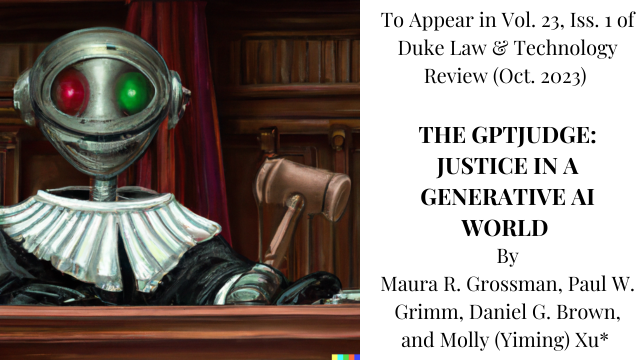[Editor’s Note: This article is to appear in Vol. 23, Iss. 1 of Duke Law & Technology Review (Oct. 2023), published here with permission. Download a PDF version here.]

By Maura R. Grossman, Paul W. Grimm, Daniel G. Brown, and Molly (Yiming) Xu*
Abstract
Generative AI (“GenAI”) systems such as ChatGPT recently have developed to the point where they are capable of producing computer-generated text and images that are difficult to differentiate from human-generated text and images. Similarly, evidentiary materials such as documents, videos and audio recordings that are AI-generated are becoming increasingly difficult to differentiate from those that are not AI-generated. These technological advancements present significant challenges to parties, their counsel, and the courts in determining whether evidence is authentic or fake. Moreover, the explosive proliferation and use of GenAI applications raises concerns about whether litigation costs will dramatically increase as parties are forced to hire forensic experts to address AI- generated evidence, the ability of juries to discern authentic from fake evidence, and whether GenAI will overwhelm the courts with AI-generated lawsuits, whether vexatious or otherwise. GenAI systems have the potential to challenge existing substantive intellectual property (“IP”) law by producing content that is machine, not human, generated, but that also relies on human-generated content in potentially infringing ways. Finally, GenAI threatens to alter the way in which lawyers litigate and judges decide cases.
Fed. R. Evid. 403 is particularly important in assessing the authenticity of potential GenAI or deepfake evidence. We outline below the steps that judges should follow when faced with determining the admissibility of such evidence.
Grossman, Maura and Grimm, Paul and Brown, Dan and Xu, Molly, The GPTJudge: Justice in a Generative AI World (May 23, 2023). Duke Law & Technology Review, Vol. 23, No. 1, 2023.
This article discusses these issues, and offers a comprehensive, yet understandable, explanation of what GenAI is and how it functions. It explores evidentiary issues that must be addressed by the bench and bar to determine whether actual or asserted (i.e., deepfake) GenAI output should be admitted as evidence in civil and criminal trials. Importantly, it offers practical, step-by- step recommendations for courts and attorneys to follow in meeting the evidentiary challenges posed by GenAI. Finally, it highlights additional impacts that GenAI evidence may have on the development of substantive IP law, and its potential impact on what the future may hold for litigating cases in a GenAI world.
To read the entire article, see below or click to download here,





